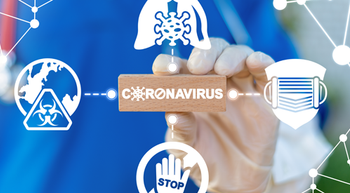
While keeping patients at home decreases their risk of contracting the virus, it can also create challenges and safety issues when it comes to procedures like infusions.

While keeping patients at home decreases their risk of contracting the virus, it can also create challenges and safety issues when it comes to procedures like infusions.

Cancer care may never be the same again after the COVID-19 pandemic. In a recent webinar, 2 oncology nurses discussed their experiences.

The worldwide pandemic caused more healthcare providers to be out of work, as well as changes in patients’ treatment regimens.

The FDA approved ibrutinib (Imbruvica) plus rituximab (Rituxan) as a frontline therapy for adults with chronic lymphocytic leukemia (CLL) or small lymphocytic leukemia (SLL).

While many providers are in favor of physician-assisted dying, others are against it, and payment may also become a barrier.

This is the first FDA approval for this patient population.

The FDA approved mitomycin gel (Jelmyto) for the treatment of patients with low-grade upper tract urothelial cancer (UTUC), cancer of the lining of the urinary system. This is the first therapy approved in this space.

Leading oncology and breast cancer organizations came together to create treatment recommendations for patients with breast cancer during the COVID-19 pandemic.

The relationship between the two maladies still remains vastly unknown.

We want to hear from you what you think about telemedicine and in-home cancer care during the COVID-19 pandemic.

The FDA approved selumetinib (Koselugo) to treat pediatric patients aged 2 years or older with neurofibromatosis type 1. This is the first-ever therapy approved for this rare genetic disorder, which causes tumors to grow on nerves.

The NCCN, ASCO, ASH, and CDC came together to publish an article on appropriate opioid use in cancer care.

CYNK-001 will be evaluated in an upcoming phase I/II clinical trial including up to 86 patients with COVID-19.

The American Association for Cancer Research wrote to Congress urging them to take action against the pandemic, and outlined how the oncology community can help.

Clinicians must weigh out the pros and cons when treating patients with cancer during the coronavirus disease 2019 (COVID-19) pandemic.

The FDA is loosening the rules for the manufactures of certain air purifiers disinfectant devices so that more can be made available.

The FDA approved durvalumab (Imfinzi) plus standard-of-care (SoC) chemotherapies etoposide with either carboplatin or cisplatin (platinum-etoposide) for the treatment of adults with extensive-stage small cell lung cancer (ES-SCLC).

A recent study from Wuhan, China, analyzed characteristics and outcomes of patients with cancer infected with the coronavirus.

Cancer immunotherapy agents may be useful in treating patients with the coronavirus disease 2019, and should be made readily available, according to the Society of Immunotherapy for Cancer.

The FDA recently stated that it is taking steps to mitigate the personal protective equipment and device shortage for healthcare professionals amid the coronavirus (COVID-19) outbreak.

“Your wellbeing and emotional resilience is essential to our patients as we work to help our community through the COVID-19 pandemic,” the organization said.

The needs of the oncology population remains a “top priority,” according to the FDA.

The Oncology Nursing Society (ONS) recently published interim guidelines – though they’re admittedly not ideal – on PPE usage in the midst of the epidemic.

Breast implant-associated anaplastic large-cell lymphoma (BIA-ALCL) is a relatively newly discovered illness, which leaves many questions for both patients and providers.

“We must protect them” one nurse said about oncology patients in the COVID-19 pandemic.

Certain patients with myelofibrosis may be at higher risk for pulmonary hypertension, according to recent research.

Healthcare providers and citizens alike are navigating uncharted territories when it comes to the novel coronavirus/COVID-19.

The National Comprehensive Cancer Network discussed problems – and potential solutions – for healthcare providers regarding the COVD-19 pandemic.

In the midst of the current opioid epidemic, pain management is taking center stage in many healthcare settings, and oncology is no different. It is crucial that patients have their pain – both acute and chronic – managed, while avoiding the potential of drug misuse. Add in barriers to care and other roadblocks, and things become even trickier.

The landscape of metastatic hormone receptor (HR)-positive breast cancer continues to evolve, highlighting the necessity of genetic and genomic testing, explained Elisa Krill-Jackson, MD.